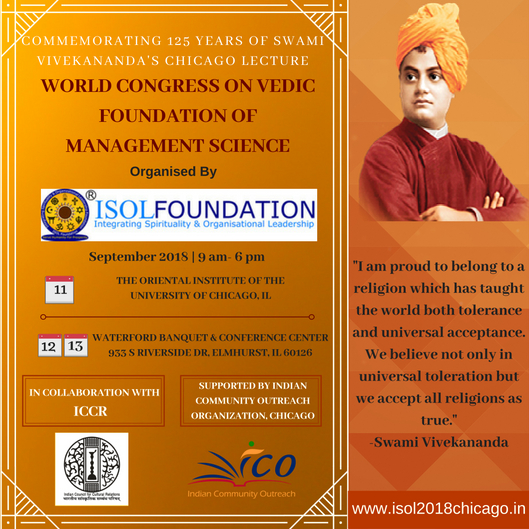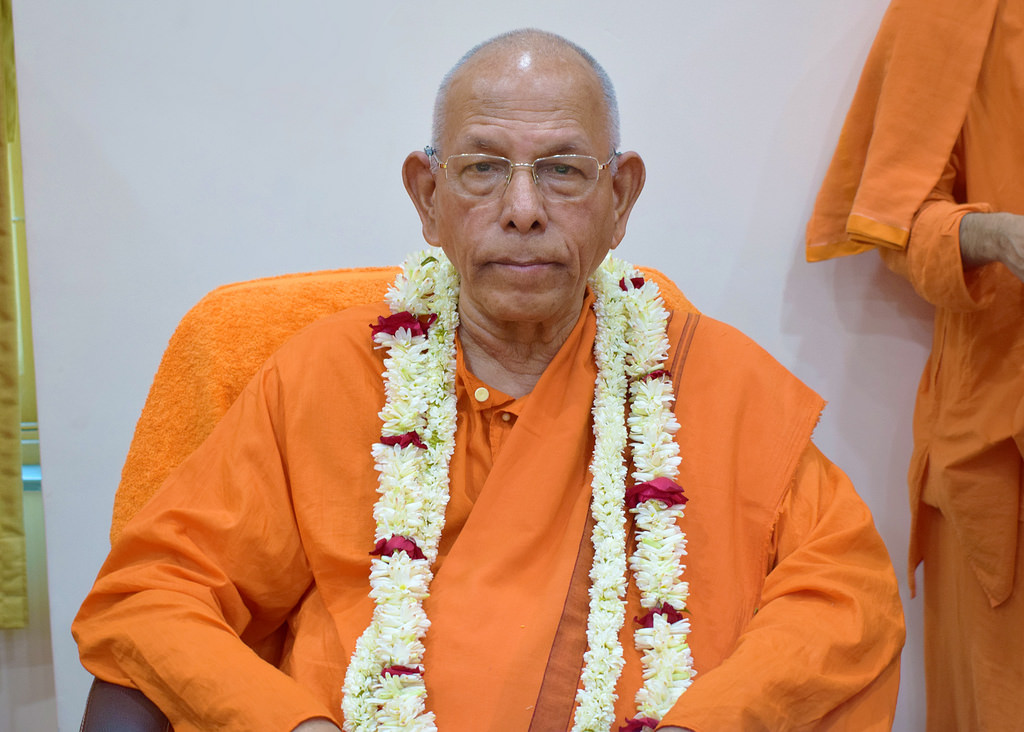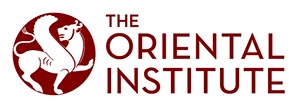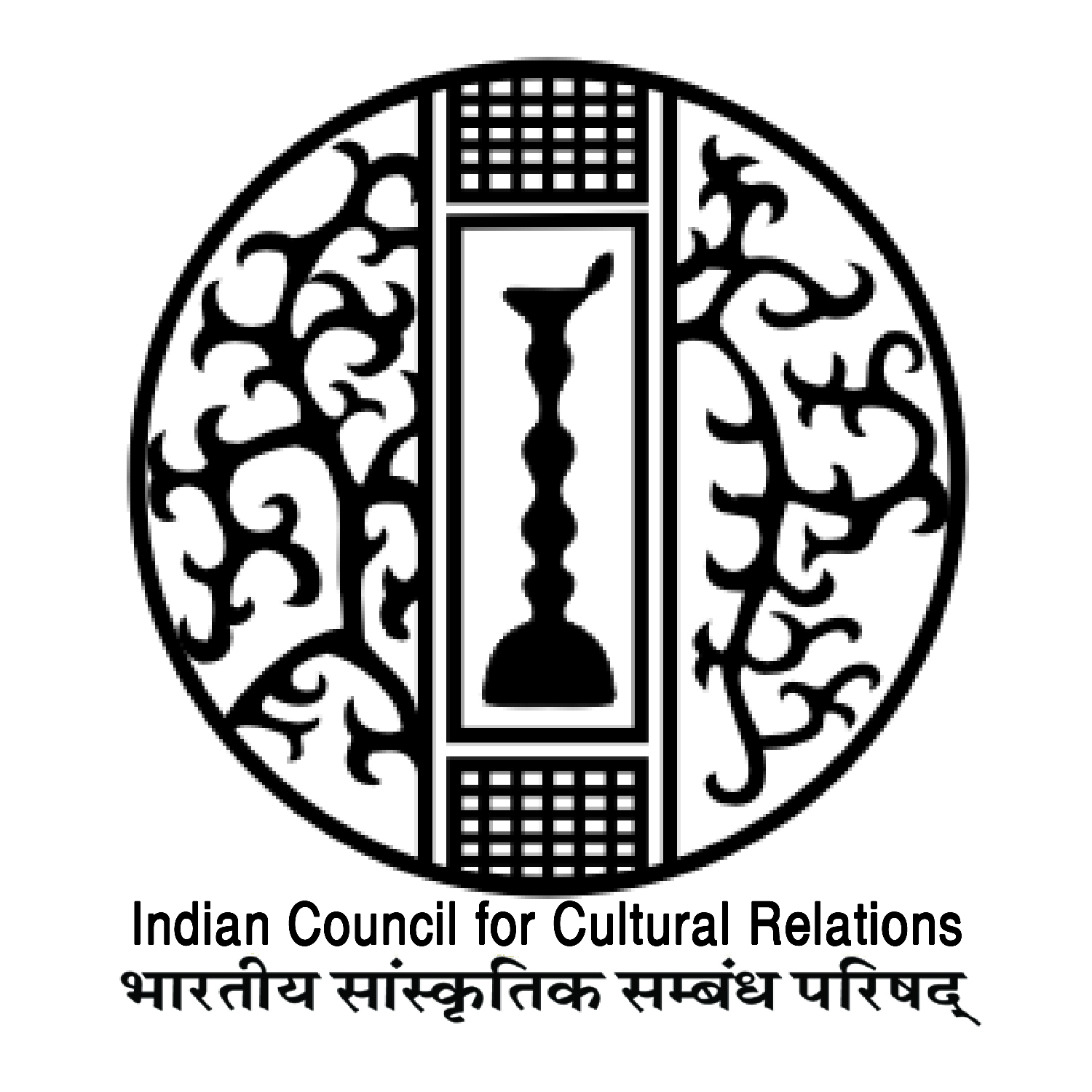









With the successful Conduction of ISOL 2018 Conference Commemorating 125 years of Swami Vivekananda’s Chicago lecture with the support of all.
ISOL acknowledges the support extended by ISOL 2018 USA Steering Committee and all the committees are dissolved now.
No commitment or agreement by any person other than Founder of ISOL Foundation will be binding on ISOL henceforth. This is for general information of all.

Integrating Spirituality and Organizational Leadership Foundation (ISOL Foundation) is an initiative that started in 2007 with a focus to emphasize the role of spiritual values in enriching enterprises for creating sustainable, non-violent and non-exploitative organizations where the entire stakeholder get satisfaction by a meaningful and trust based association.
In the race for financial gains, modern business theories have lost touch with the basic tenets of moral, spiritual and ethical values. The values that religions have infused into humanity have been thwarted in recent years. At this crucial juncture, we need to look forward by integrating religious institutions into integrated development and applications of spirituality and ethics to develop a consensus on Human Consciousness in Management Systems and global economic development.
The world Parliament of Religions in 1893 was the first attempt to bring the east – west spiritual traditions into one platform to discuss the problems of the world. In the 19th Century in India a Sage – Sri Ramakrishna Paramhansa (the spiritual master of Swami Vivekananda, who was one of the speakers in the 1893 World Congress), after practicing all the religions, boldly declare – “As many views so many paths but God is one” and talked about the fellowship of religion for the religion of humanity. This is the core of the initiatives taken by ISOL Foundation.
As a prelude to Commemorating Quasi Centenary Celebrations of Chicago Lecture delivered by Swami Vivekananda on September 11, 1893 ISOL Foundation (India) organized the 5th International Conference on Integrating Spirituality and Organizational Leadership during September 11-13, 2015 in the same hall and at the same venue (The Oriental Institute of Chicago, University of Chicago) with the same ethos (interfaith perspective) to discuss ‘Spirituality for Global Economic Development’. The Conference had the moral support and encouragements from the Council for a Parliament of World’s Religions, Chicago and Ramakrishna Mission & Math, Belur, Kolkata, India.
ISOL Foundation as the core body instituted Vedic Foundations of Indian Management and Academy for Value Based Management thus creating avenues for the scholars from different parts of India and the world to converge and create a systematic approach in the respective areas.
We at ISOL attempt to rekindle the same philosophy in the minds of people by including academicians, environmentalists, spiritualists, thinkers, scientists and representations from business houses, business associations and civil societies.
ISOL Foundation (India) is now organizing the World Congress on Vedic Foundations of Management Science during September 11-13, 2018 to commemorate 125 years of Swami Vivekananda’s Chicago Lecture in the same city of Chicago.
The Conference will be hosted by ISOL Global Foundation.
The Congress will focus on various thematic Tracks related to Vedic Foundations of Management Science and the contributions of Swami Vivekananda, his Master Sri Ramakrishna Paramhansa and Sanga Janani – Ma Sharda along with Sister Nivedita.
The Power of Vedic Values in Modern Business Management
According to economic historian Angus Maddison in his book ‘The World Economy: A Millennial Perspective’ published by the OECD Development Center in Paris in 2001, India had the world’s largest economy in the 1st century and 11th century and in the 18th century, with a 32.9% share of the world GDP in the 1st century and 28.9 % in the 1000 AD, and in 1700 AD with 24.4%.
The known economic history of India begins with Indus Valley Civilization that was the first known permanent and predominantly urban settlement that flourished between 2800 BC to 1800 BC and had an advanced and thriving economic system. One of the ways to search the alternative paradigms in management and leadership is going back to our roots—ancient Indian culture and traditions. Vedas are the sources of knowledge from Indian Wisdom. The Vedic principles are objective and supported by creative potential of Natural Law. It has universal application. The Vedic Foundations of Indian Management envisages enabling the managers to create new order of conscience based management based on Vedic insights.
Vedic Foundation of Indian Management (VFIM) is a unit of ISOL Research Foundation. ISOL Research Foundation (http://isol-research.asia) is dedicated and committed to carry out researches on Indic and Vedic Studies to discover and discuss ancient business models in modern context and promote indigenous model of management and entrepreneurship. Under the umbrella of ISOL Research Foundation, three Centres namely ISOL Centre for Integral Healing, ISOL Centre for Consciousness Studies and Vedic Foundation of Indian Management, working unanimously to enlighten corporate citizenship behaviour and promote practicing good governance. VFIM proposes a system as against the modern economic system by delving into the cultural intelligence of the ancient Indian wisdom tradition in an effort to seek an alternate paradigm in management and leadership. Since the Ancient Vedic texts preserves the treasures of knowledge within, VFIM draws out the science and technology invested in the Vedic texts.
VFIM proposes a system supporting the modern economic system by delving into the cultural intelligence of the ancient Indian wisdom tradition in an effort to seek an alternate paradigm in management science. Since the Ancient Vedic texts preserves the treasures of knowledge within, VFIM draws out the science and technology invested in the Vedic texts.
With a vision to promote indigenous models of management based on four main Vedas, this Center carries out prolific researches and organizes national and international conferences on Vedic foundations of Indian management and the relevance of Vedic texts in modern management. It also seeks to promote awareness about the wisdom of ancient scriptures and discuss ancient business model in various concepts based on Vedic Literature and Vedic Management leading to the great enhancement of modern management and entrepreneurship.

ADDRESS:
Clarion Inn
Waterford Banquets and Conference Center
933 S Riverside De,
Elmhurst,
IL 60126
Front Desk Contact Person: Rebecca




Subscribe to Conference Information by submitting your E-Mail address below



1. Universal Message of Sri Ramakrishna and Swami Vivekananda
2. Sri Ramakrishna and Universal Religion
3. Sri Sharda Devi, the Holy Mother and the Embodiment of Purity
4. Swami Vivekananda and His Practical Vedanta
5. The Doctrine of Love for Global Human Development
6. Awakening the Inner Consciousness: The Integral Yoga
7. Religion and Philosophy: The Underlying Ethical and Spiritual Thought
8. Women Enlightenment: in Action and Works of Sister Nivedita
9. Management by Inclusion: Insights from the Literature on Sri Ramakrishna
10. Management Insights from the Complete Volumes of Swami Vivekananda
1. Yoga, Ayurveda and Tantra
2. Yantra, Mantra and Meditation
3. Consciousness and Health: Inner and Outer Healing
4. Progressive Evolution of Self for Mind – Body – Soul Communion
5. The Psychic Being and the Equilibrium of Self
6. Psycho—analysis and Spiritual Healing
7. AyurvedicHealingand the Mind
8. Herbs for the Practice of Yoga, Mind and Meditation
9. Herbs and Pranic Healing
10. Neuro-psychological bases of mind and brain
11. Human Structure and Vata, kapha and Pitta
12. Mental Constitution and Tri Gunas
1. Criticality of Infinites in Consciousness
2. Cognitive Conscious Intelligence: Insights from Maharishi Pannini and Pingala
3. The Power of Mind: Vedantic Perspectives
4. Mind and Matter: Interconnectedness between Epistemological Assumptions and Neurophysiological Levels of Description
5. Cosmic Energy as a source of Human Energy
1. Ancient Roots of Corporate Entities and Modern Management
2. Ancient Indian Economy: Synthesis of Cultural, Spiritual, Economic and Political Thought
3. Ancient Indian Knowledge Systems and the Science of Management
4. Spiritual Foundations of Economics: Insights from Scriptures
5. Vedic Literature and Lessons for Management
6. Management Insights from Sam Veda
7. Management Insights from Yajur Veda
8. Management Insights from Rig Veda
9. Management Insights from Atharva Veda
10. Management Insights from Sthapatya Veda
11. Management Insights from Dhanur Veda
12. Management Insights from Ayur Veda
13. Alternative Paradigms in Management and Leadership: Insights from Ramayan and Bhagwat Gita
14. Vedic Cultural Intelligence and Modern Corporate Excellence
15. Classical Indian Epistemology for Current Management Researches
16 Arthsastra and Management
17. Ancient Indian Logic and its Application in Modern Management
18. Dharmasastra: Insights for Good Corporate Governance
19. Understanding Welfare Oriented Traditional Indian Societies
20. Structure and Functioning of Political and Legal Institutions in Ancient India and its Contemporary relevance
21. Vedic Ethics and Responsible Business Management
22. Vedic Models of Ancient Indian Management
23. Vedas and Self Management
1. Himalayas: The Eternal Source of Spiritual Progress and Development
2. The Philosophical Foundations of Himalayan Art and Culture
3. Ancient Indian Economy in Himalayan Region
4. The Himalayan Kingdoms and their Contribution to World Cultural Heritage
5. Traditions of Himalayan Tribal: Contributions to Traditional Knowledge Systems
1. Vedic Principles of Environmental Management in the Context of Modern Eco System Management
2. Ancient Indian Knowledge Systems for Sustainable Development
3. Managing Global Climate Change: Insights from Vedas
4. Spiritual Dimension of Sustainable Development
5. Traditional Knowledge System for Bio-Diversity Conservation: Insights from Ancient Texts and Integration with Modern Practice
1. Relevance of Vedic Art of Communication in Modern Management
2. The Development of Literature through Ages
3. Language and Literature: Insights into Management
4. Appreciating Poetry for Holistic Management
5. Folk Tales: Insights for Organizational Leadership from Indian Epics
6. Understanding Practical Wisdom through Indian Folklores for Enlightened Management Practices
1. The Philosophy and Science of Sanskrit: Insights for Enlightened Management Practices
2. Ethics in Business and Administration: Insights from Sanskrit Literature
3. Sanskrit Knowledge Systems and the Modern Management Science
4. Language and Testimony in Classical Indian Philosophy
5. Sanskrit and Sustainability
1. Architecture and Sculpture: The Philosophical, Spiritual and Cultural Foundations
2. Philosophy of Indian Art and Paintings
3. The Sacred Space as Planned in Ancient Indian Temple
4. Rock Architecture of Ancient India
5. Vaastu Shastra for Sustainable Development
1. Theatre, Drama and Performing Arts: The Aesthetics of Management
2. The Theoretical and Philosophical Foundations of Classical Music
3. Insights from Traditional Indian Theatre for Modern Management
4. Culture and Art: Building Correct Values and Healthy Aesthetic Perceptions
5. The Contributions from Indian Natyashastrata to Modern Management
1. The Philosophical Foundations of Cinema
2. Role of Movies in Creating Responsible Societies
3. Media as a Tool to Integrate Culture and Heritage
4. Culture and Art: Building Correct Values and Healthy Aesthetic Perceptions
5. Role of Movies and Media for Promoting World Peace
1. Modern Education: A Tree without Roots
2. Gurukul Education System in ancient Indiaand its Contemporary Relevance in Theory and Practice
3. Fundamentals of Education in Ancient India: Need to Integrate in Modern Educational System
4. The Philosophy and Course Curriculum of Ancient Indian Universities
5. Salient Features of Education in Ancient India
1. Status of Women in Ancient India
2. Women scholars Cited in Vedas and Vedic Literature
3. Shiva and Shakti: The Indian Concept of Androgyny
4. Understanding Indian Culture through Devi-Mahatmiyam
5. Contributions to Vedic Wisdom by Women Philosophers: Ghosha, Lopamudra, Maitreyi, and Gargi
1. Development of Indian Mathematical Science in the Context of Spirituality: Contributions by Aryabhata, Brahmagupta, Mahāvīra, Bhaskara II, Madhava of Sangamagrama and NilakanthaSomayaji in Indian Mathematics
2. Mathematics of Infinites in Vedantic Thought
3. The Spiritual Practices in Mathematics: Understanding The Indian Sulbhasutras – The Essentials of Geometry
4. Quantum Theories of Consciousness
5. Astronomy in Ancient India: Insights for Modern Management Science
1. Ethics in Business for inclusive growth
2. Progressive Development of individuals, organizations and societies
3. Good Governance and Collective Pride for Business Excellence
4. Leading Beyond Self: The Inside Out Approach
5. Corporate Social Responsibility and Enlightened Citizenship Behaviour
Prof. Sunita Singh Sengupta
Founder & Honorary Convener
Integrating Spirituality and Organizational Leadership Foundation
C-17, Raj International Business Centre,
Gurunanak Pura, Laxminagar, Near Scope Minar
Delhi – 110 092, India
Mob: +91 98731 67484
Email: isol2018conference@gmail.com or sunita.isolfoundation@gmail.com
